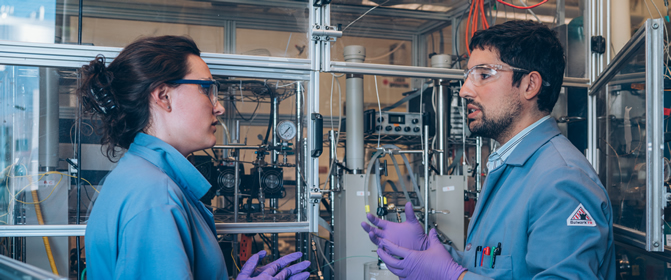The Doctor of Philosophy and Doctor of Science degrees in Chemical Engineering are identical; students may choose for themselves the appellation they prefer. This traditional, research-based doctoral degree program provides a thorough grounding in the fundamental principles of chemical engineering, as well as an intensive research experience.
The Doctor of Science and the Doctor of Philosophy in Chemical Engineering are identical degree programs. Degree candidates may choose to be called a “doctor of philosophy” or a “doctor of science”.
The degree requires that you complete:
- the core curriculum in chemical engineering
- one chemical engineering H Level class
- the departmental biology requirement
- a minor program of related subjects outside of chemical engineering
- written and oral doctoral qualifying examinations
- the writing and oral defense of a thesis on original research
The core curriculum is:
- Numerical Methods in Chemical Engineering 10.34
- Chemical Engineering Thermodynamics 10.40
- Analysis of Transport Phenomena 10.50
- Chemical Reactor Engineering 10.65
The departmental biology requirement is fulfilled by completing an undergraduate subject equivalent to MIT 7.01x, either at MIT or at your undergraduate institution. Examples of minor programs for some recent doctoral students include applied mathematics, control theory, physical, organic or analytical chemistry, mechanical structure, power systems, process metallurgy, nuclear engineering, management, economics, music, ancient history and philosophy.
The normal duration of the degree program is five to six years. (Including an intermediate M.S. CEP degree normally has little effect on the duration.) A master’s degree is not required for entrance into the doctoral program, nor is the M.S. CEP required.
Advisors
For incoming, first-year graduate students, academic advisors are members of the Committee for Graduate Students. When you select a research topic and begin your thesis, the research supervisor becomes your academic advisor. In general, students choose research advisors at the end of their first Fall semester at MIT. Should you wish to choose a research advisor from a department other than Chemical Engineering, you will also need to choose a co-advisor from the Chemical Engineering faculty.
Prior to Registration Day (Fall and Spring semesters), your subject selection must first be approved by your advisor before the Graduate Officer can authorize registration on Registration Day. Advisor approval should also be obtained for any subsequent subject add/drop actions during the term (no additional authorization by the Graduate Officer is required).


